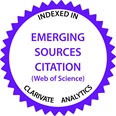Abstract
Enlargement of the European Union in 2004 was the event of crucial historical importance, which had an impact not only on new entrants, but on the whole EU as well. The same holds true for the EU's international position which largely depends on the potential this organisation can rely on in its relations with the outside world. This includes geographic, economic, demographic and social, technological, military, and other resources of all its Member States. The article was intended to present and analyse the influence the last round of enlargement had upon the evolution of the European Union global potential. Such influence cannot be described unambiguously. In fact, in some areas negative trends previously existing in the former Fifteen were aggravated (for example, macro-economic ratios per capita). On the other hand, however, it occurred that despite their relative inferior economic and social condition, new Member States managed to contribute serious assets and resources to the EU (e.g. as regards ample reinforcement of its demographic and social potential, for instance in the area of education of youth). While it is yet too early to draw ultimate conclusions, generally it remains safe to argue that the enlargement, owing to an injection "fresh blood", provides the EU with better opportunities for future growth, including consolidation of its international standing.
Abstrakt
Rozszerzenie Unii Europejskiej w 2004 r. było historycznie ważnym wydarzeniem oddziałującym nie tylko na państwa nowoprzyjęte, ale także na całą Unię. Dotyczyło to także międzynarodowej pozycji UE, która zależy od potencjału, jakim ugrupowanie to dysponuje w stosunkach ze światem zewnętrznym. Potencjał ten obejmuje realne zasoby geograficzne, ekonomiczne, demograficzno-społeczne, technologiczne, militarne itp. wszystkich państw członkowskich. Celem artykułu jest prezentacja i analiza wpływu, jaki wywarło ostatnie rozszerzenie na ewolucję potencjału Unii Europejskiej w świecie. Wpływu tego nie da się scharakteryzować jednoznacznie. W pewnych dziedzinach rozszerzenie pogłębiło negatywne trendy już wcześniej występujące w ramach "Piętnastki" (np. w odniesieniu do wskaźników makroekonomicznych liczonych per capita). Z drugiej jednak strony, okazało się, że pomimo swej relatywnie gorszej pozycji ekonomiczno-społecznej nowe państwa członkowskie potrafiły wnieść do UE poważne atuty i zasoby (m.in. w zakresie wydatnego zwiększenia potencjału demograficznego i społecznego, np. w sferze edukacji młodzieży). Chociaż jest jeszcze za wcześnie na wyciąganie ostatecznych wniosków, ogólnie można stwierdzić, że rozszerzenie stwarza dla Unii - dzięki swoistemu "odświeżeniu krwi" - lepsze szanse przyszłego rozwoju, w tym także dalsze wzmocnienie jej pozycji na arenie międzynarodowej.
Recommended Citation
Milczarek, D. (2005). Międzynarodowa pozycja Unii Europejskiej po rozszerzeniu. Problemy Zarządzania, 3(9), 93-113. Retrieved from https://press.wz.uw.edu.pl/ems/vol3/iss9/6
First Page
93
Last Page
113
Page Count
20
Publisher
University of Warsaw







